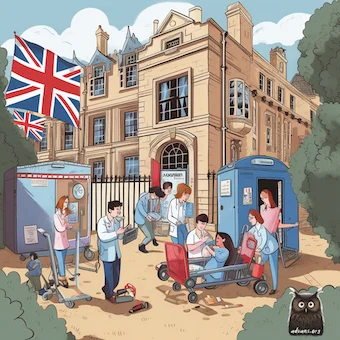Introduction: In the United Kingdom, the three letters “NHS” carry a profound meaning—a symbol of unity, compassion, and unparalleled commitment to the health and well-being of its citizens. Established on July 5, 1948, the National Health Service stands as a testament to the belief that healthcare should be accessible to all, regardless of wealth or status. Join us as we delve into the origins, values, and enduring legacy of the NHS, a remarkable institution that has become an integral part of British society.
Born out of the post-World War II spirit of collective responsibility, the NHS was founded on the principle that quality healthcare should be available to every individual, irrespective of their ability to pay. It embodied the vision of Aneurin Bevan, the then-Minister of Health, who championed the idea of a comprehensive healthcare system that would provide cradle-to-grave coverage for all UK residents.
The NHS operates on three core principles: that it meets the needs of everyone, that it remains free at the point of delivery, and that it is based on clinical need rather than the ability to pay. These principles ensure that healthcare is accessible to all, offering a range of services including general practitioner (GP) consultations, hospital care, emergency services, mental health support, and much more. From routine check-ups to life-saving treatments, the NHS caters to the diverse needs of the population, making it a lifeline for millions.
The NHS owes its success not only to its principles but also to the dedicated healthcare professionals who tirelessly serve the nation. Doctors, nurses, paramedics, administrators, and countless others work in harmony to provide compassionate care and support to patients. The NHS prides itself on its diverse workforce, welcoming individuals from all backgrounds, ethnicities, and cultures, enriching the system with a range of experiences and perspectives.
Throughout its existence, the NHS has faced numerous challenges. Demographic shifts, advancements in medical technology, and increasing financial pressures have placed strains on the system. Yet, the NHS has displayed remarkable resilience, continuously adapting to meet the evolving needs of a changing society. It remains a cornerstone of the UK’s social fabric, a testament to the power of collective healthcare provision.
The outbreak of the COVID-19 pandemic in 2020 posed an unprecedented challenge to the NHS. Healthcare professionals worked tirelessly, risking their own well-being to save lives and provide essential care. The pandemic showcased the dedication, resilience, and unwavering commitment of NHS staff, reaffirming the profound importance of the healthcare system and its role in times of crisis.
The NHS holds a special place in the hearts of the British people. It represents a social contract, a promise that healthcare will be available to all, regardless of circumstance. The system fosters a sense of national pride, embodying the values of compassion, equality, and solidarity. It is a source of comfort and reassurance, a safety net that offers support during life’s most challenging moments.
As we reflect on the National Health Service, let us celebrate the extraordinary achievements of an institution that has become a beacon of healthcare excellence. From its humble origins to its present-day impact, the NHS has become a source of inspiration and admiration, not just within the United Kingdom, but across the world. May the NHS continue to thrive, adapt, and serve generations to come, embodying the values of compassion and inclusivity that define the essence of a caring society.
Long live the National Health Service, the pride of the United Kingdom.
Disclaimer: This article provides a general overview of the NHS. For accurate and up-to-date information, please refer to official sources and NHS guidelines.